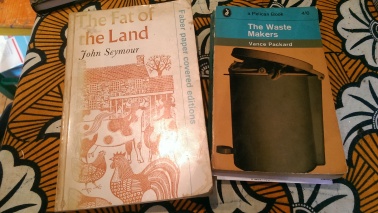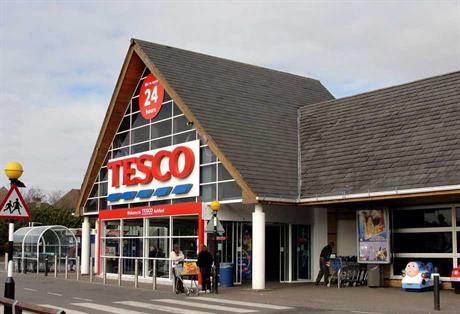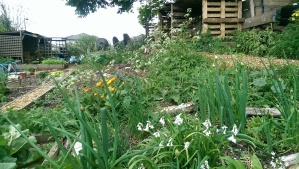I am currently tandem reading two books written in the late 1950’s that are giving me a very interesting perspective on the current ‘trend’ for 1970’s style self sufficiency :
‘The Fat of the Land’ by John Seymour (1960)
‘The Waste Makers’ by Vance Packard (1960)
 The first of which describes the authors learning process in self providing in Suffolk, and the second describes the drive to ever increasing consumption in the US. Both of them, although probably now disappeared from print, perhaps never to reappear, seem to have much to say to us now, nearly two generations on.
The first of which describes the authors learning process in self providing in Suffolk, and the second describes the drive to ever increasing consumption in the US. Both of them, although probably now disappeared from print, perhaps never to reappear, seem to have much to say to us now, nearly two generations on.
John Seymour does an amount of moaning about the extent to which the government was restricting people’s ability to self-provide : rules about home brewing and animal slaughter, which were discouraging people from continuing these ordinary traditional ways of making their living. My father grew up in Walthamstow in the 1930’s and 40’s, which was in most respects, given the age of most of the houses there, much like the Walthamstow of today. He lived at the bottom of the market, and remembered local pig farms, and that most people kept chickens or rabbits in their back gardens, as well as growing their own vegetables.

By the time I grew up in the 70’s and 80’s, most older people still grew veg in their back garden, but most younger families had stopped, and most English people I talk to about growing food now are usually at least a generation away from someone with experience. This was when the supermarkets came : first in the town centre, then on the edge of town, then , when their need for car parking outgrew the towns, they were built on land that used to be farmed, in a plasticised vernacular of an American farmstead, the irony of which I am sure is lost on most users.

It is always fun to look back on what seemed like progress to the people of the past : well do I remember the excitement of that weekly shop in Tesco’s in Lowestoft, that must have arrived in about 1981! : we went along ‘en famille’, probably on a Friday like everyone else, and always had a post- supermarket feast of exotic items like baguette ( bread, in the shape of a stick!) and brie ( mouldy cheese! That you eat!) that were not available in the bakers, or the International Stores. When we first moved to our council house (the shame!), we had a chicken run next to the veg patch, and they would alternate year by year, so the soil could be picked free of pests and manured, and the chickens could find some of their own food, and provide us with eggs, and a useful place to recycle kitchen food scraps. But I think gradually, it all seemed like too much hassle, and it was easier and cleaner to just buy it all in. Great Britain did become ‘Great’, after all, by kicking the peasants off the land, so they were hungry and available to work for low wages in the Victorian factories: the second phase being to create willing and dependent consumers with no idea where food comes from, let alone how to grow it. Londoners from further afield tend to be less alienated from the land : almost without exception : Cypriots, Italians, Somalis, Bengalis, Caribbeans, Africans, Irish, Polish and Romanians : all seem to have a clearer and more recent memory of raising food at home : London’s diversity has always been the key to its survival, and this untapped knowledge is yet another unrecognised benefit that its adopted sons and daughters can bring.
Vance Packard’s book laments the invention of the concept of ‘planned obsolescence’ : whereby household machines were built to break down or go out of fashion as quickly as possible, to keep the economy growing, and never mind the waste of resources involved. As an interesting aside, he briefly discusses the dire implications of American dependence on other nations for resources, and wonders if this might result in political interventions in future struggles, where supplies of raw materials are threatened. Is it going too far to say that every war since the end of the Cold War, has been to some extent about control of oil?
It doesn’t seem that much has changed since the time these books were written : advertising still works by removing our sense of well being in ourselves and offering to sell it back, except now its not just our clothes and machines that need replacing, but our bodies as well. Governments still hamper our freedom to use the land we live on to live, except now its by welcoming rich oligarchs to stockpile it for future profit, and by surrounding the lucky few in social housing with deserts of grass, cut short for dogs to crap on. Nowadays there are again urban back to the land dreamers, especially concentrated in places like Stoke Newington, where I now (almost) live, and they are teaching themselves to use the land to grow food, and dreaming of a dream of resilient living.
